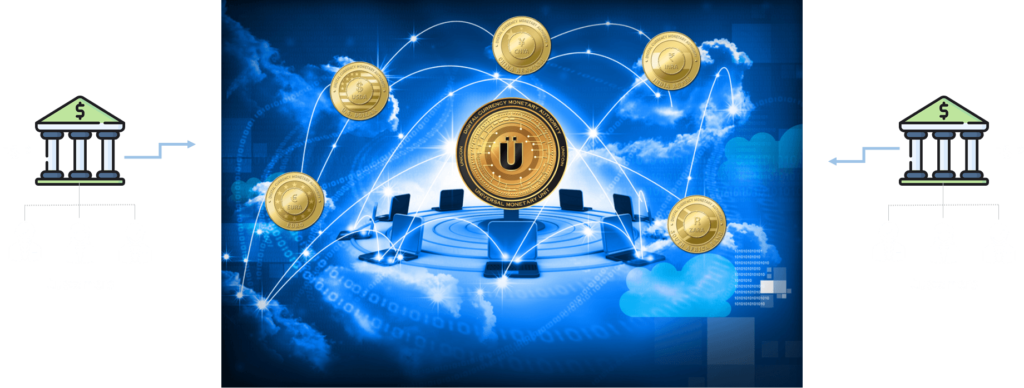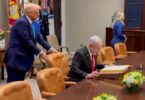The International Monetary Fund (IMF) has announced they are working on a new global central bank digital currency (CBDC), to ultimately transition away from the paper cash system in what they are referring to as “a new vision.”
At a conference in Rabat, Morocco on Monday, officials at the IMF said they want central banks to reach an agreement for a common regulatory framework for cross-border CBDC payments, unlocking digital interoperability. If not established, the group believes that this will create a void taken over by decentralized cryptocurrencies.
In a written speech published after she engaged in open dialogue with Governor of Bank Al Maghrib Abdellatif Jouahri and others in a panel discussion, IMF chief Kristalina Georgieva explained that their conversations stemmed around the implementation of CBDCs, and the IMF’s broader initiative they call the “High-level Policy Roundtable on Central Bank Digital Currencies: The Role of the Public Sector in Money and Payments – A New Vision.”
According to her, the panel “agreed on the need to continue dialogue on CBDCs and to gather and share knowledge and information for the benefit of our member countries in Africa, the Middle East, and beyond.”
During these talks she listed the benefits of CBDCs, such as increased “inclusion” by broadening access to financial services at lower costs, along with establishing cross-border payments “and remittances [that are] cheaper and quicker,” she said. However she also noted the risks if a CBDC is poorly designed, leading to things like economic instability, privacy issues, cyber attacks and hacks, and other operational risks. Notwithstanding the IMF chief said “CBDCs could reduce the number of intermediaries in cross-border payments, foster competition and enhance transparency.”
These are important considerations for the IMF, as we have a mandate to help ensure that digital money, including CBDCs, fosters domestic and international economic and financial stability.
Georgieva said
Tobias Adrian, Financial Counsellor and Director of the Monetary and Capital Markets Department at the IMF, also weighed-in in a prepared speech at the forum, where he discussed the “opportunity for money to evolve.” He noted that besides the IMF, the World Bank, the Bank of International Settlements (BIS), and the Russian-controlled Federal Security Service (FSB) are “tightly collaborating” to advance this venture.
Speaking on the CBDCs and this new cross-border system, Adrian stated:
This will bring people together through faster and cheaper payments, and countries together through a more stable and cohesive international monetary system.
It’s about technology, but it’s also about governance, which establishes the “rules of the game.”
These are tricky to establish, but an organization such as the IMF with its wide membership, focus on macro-financial interactions, and well-oiled internal governance can help countries build consensus.
To get global finance right, we must come together to get global payments right.
He went on to describe “the vision” “for a trusted ledger,” that basically is “an electronic document representing property rights on which digital versions of central bank reserves in any currency can be traded among participants,” he said, and that it cannot “exist in a vacuum;” for which “only those who need it can see it.”
Adrian provided more insight in how this system would operate:
The platform would settle money denominated in many different currencies. […] To make these interchangeable, we propose creating unique and standardized digital representations of them on the platform.
To make a payment, participating banks would deposit their domestic central bank reserves in an escrow account controlled by the platform operator, and in return obtain a digital version to trade on the platform.
In the case of the Moroccan ceramics exporter, its bank would receive tokenized reserves from the Spanish customer’s bank. The exporter’s bank would credit the exporter’s account, but may not be terribly happy holding euro reserves. So it could sell them to another participant on the platform in exchange for domestic reserves.
Settlement would be quick, final, and safe. The ledger would be controlled by the platform operator, and only this operator would settle transactions. The single ledger would ensure there is a unique description of who owns what, so no double spending can occur.
He later stated: “As money, CBDCs provide safety. As infrastructure, CBDCs bring interoperability and efficiency among private networks for digital money and assets.”
SEE: New Poll Shows Almost Three-Quarters Of Americans Have Never Heard Of A CBDC
As noted earlier, other international financial bodies are working on creating new CBDC systems. In November of last year BIS completed their first successful cross-border CBDC transaction; and earlier this year they launched their “Project Icebreaker” to further facilitate and rollout a cross-border CBDC platform.
In April the Digital Currency Monetary Authority jointly launched what they call “Unicoin” with the IMF, which would facilitate a central hub that will allow nations to convert their CBDCs into a single one to better facilitate international commerce.

AUTHOR COMMENTARY
[16] And he causeth all, both small and great, rich and poor, free and bond, to receive a mark in their right hand, or in their foreheads: [17] And that no man might buy or sell, save he that had the mark, or the name of the beast, or the number of his name. [18] Here is wisdom. Let him that hath understanding count the number of the beast: for it is the number of a man; and his number is Six hundred threescore and six. Revelation 13:16-18
While we still have some ways to go yet, we can clearly see the next bricks being laid for the eventual mark of the beast.
Ignore all the propaganda and shenanigans: the world is clearly moving one direction and the nations are all racing to implement the digital trap; which would be the biggest loss of freedom and liberty ever, as this would allow central banks, tax collectors, and governments to know precisely what everyone spends, which can then be controlled to make people behave certain ways.
Warn people and fight it.
[7] Who goeth a warfare any time at his own charges? who planteth a vineyard, and eateth not of the fruit thereof? or who feedeth a flock, and eateth not of the milk of the flock? [8] Say I these things as a man? or saith not the law the same also? [9] For it is written in the law of Moses, Thou shalt not muzzle the mouth of the ox that treadeth out the corn. Doth God take care for oxen? [10] Or saith he it altogether for our sakes? For our sakes, no doubt, this is written: that he that ploweth should plow in hope; and that he that thresheth in hope should be partaker of his hope. (1 Corinthians 9:7-10).
The WinePress needs your support! If God has laid it on your heart to want to contribute, please prayerfully consider donating to this ministry. If you cannot gift a monetary donation, then please donate your fervent prayers to keep this ministry going! Thank you and may God bless you.








brother, i know its worrisome to read all this junk about digital currency but always remember it wont even succeed 2 years in TTOJT time. i understand in the meantime its still worth warning souls and hindering the anti-christ.
i wonder if ever you felt like i do about knowing the future in the book of Revelation how its such a blessing but yet it vexes my soul to see so many dont know but could know.
So what are you implying, are you saying I should not even report on it? I’m not “worried” about it, I’m just reporting on developments. Take it for what you will.
I always was interested in this topic and still am, thankyou for putting up.
I was studying some of your articles on this website and I believe this internet site is very informative ! Continue posting.
Very well written information. It will be useful to everyone who utilizes it, including myself. Keep up the good work – i will definitely read more posts.
Saved as a favorite, I really like your blog!
Hey, you used to write wonderful, but the last several posts have been kinda boring… I miss your super writings. Past several posts are just a bit out of track! come on!
I don’t normally comment but I gotta say appreciate it for the post on this amazing one : D.